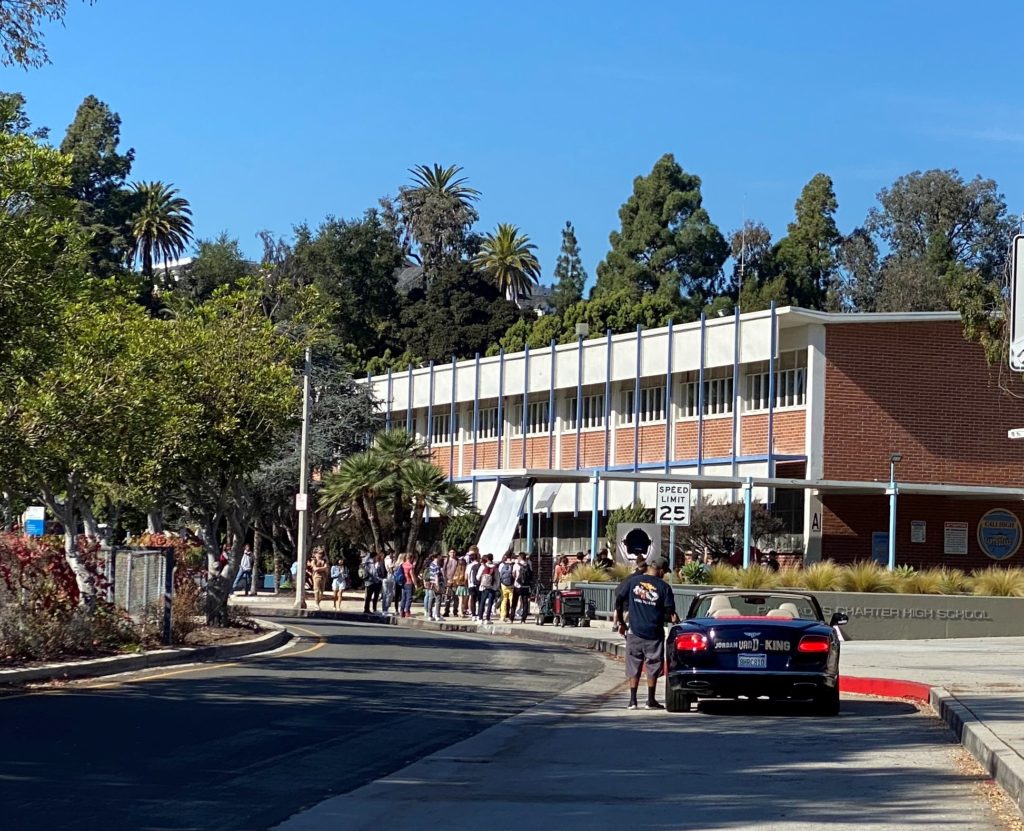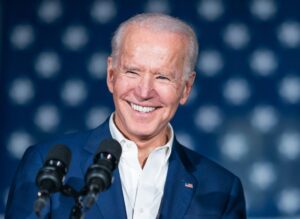
A movie was filming in front of Palisades High School on November 17. Extras were allowed at the high school, but students have not been allowed there since March 2020.
Ross Novie, the father of two Palisades High School students, is leading a non-partisan campaign, LA School Uprising, asking that public schools reopen.
Novie told Circling the News that his daughter, 16, and son, 14, have suffered the effects of virtual learning. “The impact of distance-learning has been awful for them,” he said. “It has turned bright, engaged learners into sad, unmotivated, depressed children. I know I’m not the only parent to see their kids struggle with online education.”
 Novie should be gaining hope because in a January 21 executive order, President Joe Biden stated: “It is the policy of my Administration to provide support to help create the conditions for safe, in-person learning as quickly as possible; ensure high-quality instruction and the delivery of essential services often received by students and young children at school, institutions of higher education, child care providers, and Head Start programs; mitigate learning loss caused by the pandemic; and address educational disparities and inequities that the pandemic has created and exacerbated.”
Novie should be gaining hope because in a January 21 executive order, President Joe Biden stated: “It is the policy of my Administration to provide support to help create the conditions for safe, in-person learning as quickly as possible; ensure high-quality instruction and the delivery of essential services often received by students and young children at school, institutions of higher education, child care providers, and Head Start programs; mitigate learning loss caused by the pandemic; and address educational disparities and inequities that the pandemic has created and exacerbated.”
As Novie pointed out, “Los Angeles Unified School District is one of the only major districts in the country, and throughout the world, to have not had any in-person learning since the beginning of the pandemic.”
Dr. Anthony Fauci, the nation’s top infectious disease expert, said in a December 30 online conversation with California Governor Gavin Newsom that schools can be opened safely. (Many private schools in California have already opened.)
Fauci that it seemed “almost counter-intuitive” that schools “seem to be doing better when it comes to the level of infection” than out in the community at large. “If you really want to get society back to some form of normality, one of the first things you have to do is to get the children back in school,” he noted.
“The CDC, the WHO, and the LA Times all recommend schools do everything they can to open,” Novie said. “We are seeing tremendous damage being done, particularly to underserved students.”
In a December USA Today story (“Students Are Falling Behind in Online School. Where’s the COVID-19 ‘Disaster Plan” to Catch Them Up?”), the author wrote about a student in Milwaukee Public Schools: “Virtual learning might be keeping Ruby, 14, and her family safer during a public health crisis. But it has made it exponentially harder for her to stay motivated and learn. Her online classes are lecture-heavy, repetitive and devoid of student conversation. Her grades have dropped from A’s and B’s to D’s and F’s. She stays up too late. She sleeps a lot. She misses her friends.
“A slew of new reports show alarming numbers of kids falling behind, failing classes or not showing up at all. One report that estimated the average student could lose five to nine months learning by June, with students of color losing more than that.
“Beyond that, tens of thousands of children are unaccounted for altogether.” The story reported that Hillsborough County, Florida, started the year missing more than 7,000 students and “Los Angeles saw kindergarten enrollment drop by about 6,000.”
A team of researchers at Stanford University examined NWEA (the nonprofit testing organization) test scores for students in 17 states and the District of Columbia last fall. “The average student had lost a third of a year to a full year’s worth of learning in reading, and about three-quarters of a year to more than a year in math since schools closed in March,” the report estimated.
An Annenberg Institute for School Reform at Brown University study (“Achievement Gaps in the Wake of Covid-19”) showed that in the Netherlands, where schools were closed for only eight weeks and the infrastructure for remote learning is excellent, kids lost the equivalent to one-fifth of a year of schooling.
“They also show that the average child made little progress while learning from home through online instruction,” the report stated. “An especially troubling finding was that learning losses were 55 percent larger among students whose parents had relatively low levels of educational attainment than among children with more highly educated parents.
“Educational researchers predict that COVID-19 will markedly increase achievement gaps between children from low-income families and those from higher-income families.”
Private schools have opened in Pacific Palisades and elementary students are attending in-school classes, but public schools stay closed.
“I’m pushing for Los Angeles schools to safely open for those who wish to return to in-person learning this upcoming semester,” Novie said. “I’ve got a petition with over 1,000 signatures (https://www.change.org/laschooluprising) and I’m part of a statewide effort of similarly focused groups launching next week.”
The L.A. School Uprising website gives parents several options, such as emailing local officials to let them know how they feel or signing the petition.
Visit: Twitter: @uprisingla • Instagram: laschooluprising
